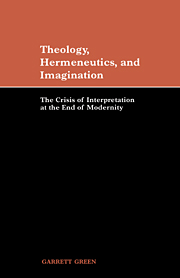1 - Theological hermeneutics in the twilight of modernity
Published online by Cambridge University Press: 22 September 2009
Summary
When philosophy paints its gray on gray, a form of life has
grown old, and with gray on gray it cannot be rejuvenated but
merely recognized. The Owl of Minerva begins her flight only
at the coming of twilight.
Hegel… there are no facts, only interpretations.
NietzscheTheological hermeneutics began in the Garden of Eden, as any careful observer of the serpent, that subtle hermeneut of suspicion, will at once recognize. In the earliest recorded misinterpretation of a religious text, he asks the woman, “Did God say, ‘You shall not eat of any tree of the garden’?” We do not need to have read Foucault in order to discern the power ploy underlying the serpent's exegesis. And even without a Freudian or a feminist to decode the real meaning of snakes who offer their interpretive services to young women, we may suspect that gender (not to mention sex) plays a role in the interchange. Now, whether or not the issues we call hermeneutical have really been around since creation, they have surely been with us for a very long time indeed – as long as human beings have appealed to oral or written texts for orientation and meaning in their lives.
- Type
- Chapter
- Information
- Theology, Hermeneutics, and ImaginationThe Crisis of Interpretation at the End of Modernity, pp. 1 - 22Publisher: Cambridge University PressPrint publication year: 1999

